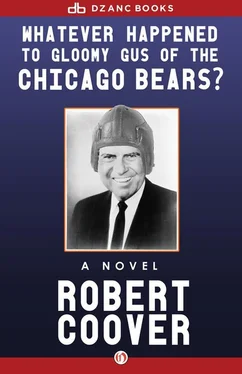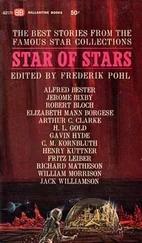Robert Coover - Whatever Happened to Gloomy Gus of the Chicago Bears?
Здесь есть возможность читать онлайн «Robert Coover - Whatever Happened to Gloomy Gus of the Chicago Bears?» весь текст электронной книги совершенно бесплатно (целиком полную версию без сокращений). В некоторых случаях можно слушать аудио, скачать через торрент в формате fb2 и присутствует краткое содержание. Год выпуска: 2014, Издательство: Dzanc Books, Жанр: Современная проза, на английском языке. Описание произведения, (предисловие) а так же отзывы посетителей доступны на портале библиотеки ЛибКат.
- Название:Whatever Happened to Gloomy Gus of the Chicago Bears?
- Автор:
- Издательство:Dzanc Books
- Жанр:
- Год:2014
- ISBN:нет данных
- Рейтинг книги:4 / 5. Голосов: 1
-
Избранное:Добавить в избранное
- Отзывы:
-
Ваша оценка:
- 80
- 1
- 2
- 3
- 4
- 5
Whatever Happened to Gloomy Gus of the Chicago Bears?: краткое содержание, описание и аннотация
Предлагаем к чтению аннотацию, описание, краткое содержание или предисловие (зависит от того, что написал сам автор книги «Whatever Happened to Gloomy Gus of the Chicago Bears?»). Если вы не нашли необходимую информацию о книге — напишите в комментариях, мы постараемся отыскать её.
Whatever Happened to Gloomy Gus of the Chicago Bears? — читать онлайн бесплатно полную книгу (весь текст) целиком
Ниже представлен текст книги, разбитый по страницам. Система сохранения места последней прочитанной страницы, позволяет с удобством читать онлайн бесплатно книгу «Whatever Happened to Gloomy Gus of the Chicago Bears?», без необходимости каждый раз заново искать на чём Вы остановились. Поставьте закладку, и сможете в любой момент перейти на страницу, на которой закончили чтение.
Интервал:
Закладка:
I’m just finishing the last panel when Harry’s sister Golda arrives with a paring knife in her hand. “I seen it when I went by earlier, Meyer. I come back to scrape it off.” She seems pretty shaken. Of course, she’s been through a lot of late. “It’s terrible, Meyer. What’s happening to our people?”
“Don’t let it upset you, Golda. Just kids, probably.”
“I’ll be honest, when I first seen it there I looked the other way and run off. Then I got mad at myself and so I come back.”
“I know. I nearly couldn’t open the door at first. But it’s okay now,” I say, smiling up at her. She looks older than she has recently, worn down, vulnerable. “Golda, listen, I’m sorry. I just came from the hospital. Gus is dead.”
“I know. Harry called me after he seen you.” She sighs heavily, holding one breast. “People are wonderful, Meyer, they can get used to everything in this world.” The very words no doubt of our brethren in the German ghettos, streets of Guernica, hills of Ethiopia. It’s a sentiment neither Gorky nor I much admire, but have learned to live with, even in ourselves, as though to acknowledge its universality. “I like the flowers,” she says. “But… still it’s scary. You can’t forget what’s underneath.”
“That’s sort of the idea, Golda.” I tell her about the fresh strawberries and she goes back to my room to wash them while I clean out my brush. She notices my wet clothes and makes me take them all off. She hangs them outside, while I change into dry underwear, thick socks, and a sweater. I don’t have a second pair of pants.
What with all this domesticity, the fruity perfume of the strawberries (she’s put them in a little vinegar and sugar to bring the juices out), the day’s stresses, the memories the room holds for Golda, and the essential loneliness we both share, we soon find ourselves tumbling about on the ceremonial cot together. I apologize that I don’t have Gus’s technique and can’t do what he did for her, but she laughs sadly and says it’s all illusion anyhow, just a trick of the imagination. She coaches me in a few gimmicks she’s picked up from Gloomy Gus and seems to have a good time. Afterwards, having kissed all my bruises, even the ones on my behind (“battle wounds,” she calls them, licking at them tenderly, respectfully), she hugs me close and says she was very satisfied, and I can’t complain. My Homecoming Queen. I’m afraid she’s going to ask me why I don’t have a girlfriend, and that’s exactly what she does. “A healthy boy like you, Meyer…”
“I like to be alone, Golda.”
She’s quiet for a moment. “Do you want to be alone now?”
“No,” I lie. “No, this is great.” How did Gloomy Gus do it, I wonder. Just in and out and never look back: that’s the coaching I really need. “But I do have to be alone a lot, and it’s hard for girls to understand that.”
“You’ve had girls living with you, Meyer?”
“Sometimes. I’ve always liked having them around, but it’s never worked out. They sit in the studio reading a book, insisting they won’t bother me, but of course they already are. They try painting while I sculpt — I’m very weak, it’s their paintings I spend the day with. I build up to my best work all day, but just then I hear them frying something on the stove. I can’t let it get cold, can I? The minute the thought crosses my mind, I’ve lost my momentum. On the very best days, I rarely get more than twenty or thirty perfect minutes, the rest all preparations and reflections, and with all the best intentions, they’ve taken these moments away from me. It’s always hard to tell them to go away and leave me alone for a while — and sometimes I mean for several days, even weeks — in fact, it’s the hardest thing of all. Almost I can’t do it. So finally I’ve found it best to avoid the problem. For now, anyway.”
“The trouble is, Meyer,” she says softly, “you’ve never been in love.”
“Why do you say that?”
“Because it’s always ‘they,’ not ‘she.’ “
“That’s just my shyness, Golda, in talking about it.”
“But don’t you get lonely sometimes?”
“Sure.”
“Meyer, I won’t bother you, I promise. But when you get lonely, call me up, okay?”
“Okay, Golda. But—”
She presses her finger on my lips. “I know, I know,” she says. “Let’s have some strawberries.”
She seems calmer now, almost happy. We sit on the edge of the cot in our underwear, munching the bright-red strawberries and talking cheerfully about Gloomy Gus. I describe the scene down at the hospital, she tells me about the last time he made love to her. It was just like all the other times until she asked him if it was the only way he knew, and — whirr- click! — he switched tracks and treated her to a feast of oral sex unlike anything she’d ever known before.
“You mean sixty-nine?”
“Yeah, well,” she grins, strawberry juice trickling out the corners of her mouth, “I didn’t take no more chances with numbers…”
The one thing she couldn’t get used to, she says, was how inconsistent he was: desperately in love with her one moment, utterly indifferent the next. “He was just a gay deceiver, Meyer,” she sighs.
“Well,” I smile, “more like a coldhearted craftsman, I’m afraid. One thing he always said in interviews: ‘What determines success or failure is the ability to keep coldly objective when emotions are running high.’ He isolated himself from his feelings through discipline. He lived life in a kind of time-tunnel. Every minute of every day he lived was completely used up in working on his skills, even when he seemed to be simply enjoying them.”
“He did seem very serious…”
“I work pretty hard, Golda, but next to him I’m a complete amateur. I wouldn’t be surprised if even his dreams were training programs. Maybe that was where he kept up the old skills he’d learned before giving them up for football and girls.”
“He always told me he dreamed of me, Meyer,” she whispers, gazing lovingly upon a plump red strawberry, the best of the box. “Probably it was just sweet nothings, hunh? Salting me up…”
“You know, I don’t think he knew what love was all about — or football either. He’d taught himself how to score, but after he’d scored he didn’t know what to do but score again.”
“I know. A girl just didn’t know where she was with him…”
“He was very skillful, Golda, but he was a man without an overview. He lived this rigid, segmented, repetitive life, and he couldn’t step back. His inability to discriminate was phenomenal. He was a freak, all willpower, no judgment—”
“You mean,” she muses, strawberry juice dribbling down her soft chin, “he was a eager beaver who couldn’t see past the end of his own shnozzle…”
“You could say so,” I smile. “You know, people complain we don’t live enough in the here and now. Either we’re absorbed in the past or daydreaming about the future, which is presumably a very crazy way to behave, because we’re missing the real thing and taking the imaginary thing as real. ‘Live like each moment is your last,’ they say.”
“They’re right, Meyer. It’s the truth.”
“But that was just how Gus lived, though without the morbid touch: moment by moment, each out cut off from the next, fulfilling his timetable. We talk about living in the present because we can’t imagine actually doing it. He did it. He was in that sense the perfect realist, the absolute materialist.”
“He was a lot smarter than me, I know that.”
“We think of the past and the future as part of a kind of river, a time-stream, but this is just a poetic metaphor. Gus had no perception of this or any other metaphor. He was completely metaphor-free. He had no imagination at all!”
Читать дальшеИнтервал:
Закладка:
Похожие книги на «Whatever Happened to Gloomy Gus of the Chicago Bears?»
Представляем Вашему вниманию похожие книги на «Whatever Happened to Gloomy Gus of the Chicago Bears?» списком для выбора. Мы отобрали схожую по названию и смыслу литературу в надежде предоставить читателям больше вариантов отыскать новые, интересные, ещё непрочитанные произведения.
Обсуждение, отзывы о книге «Whatever Happened to Gloomy Gus of the Chicago Bears?» и просто собственные мнения читателей. Оставьте ваши комментарии, напишите, что Вы думаете о произведении, его смысле или главных героях. Укажите что конкретно понравилось, а что нет, и почему Вы так считаете.












